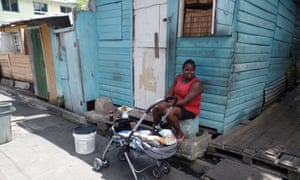As Guyana struggles to tackle a nationwide housing shortage, residents of an informal community in the heart of the capital have a wishlist of their own

On a sunny day, light bounces off the graffitied walls of the area’s shacks and tiny shops. But when the rains come, water streams over the leaky rooftops and into gutters, flooding the area and bringing disease. Torrential rains in recent years have caused outbreaks of leptospirosis across the low-lying capital.
Tiger Bay is one of numerous informal settlements that have sprung up across the South American country, where successive governments have struggled to tackle a chronic housing crisis.
In May 2015, when Guyana voted in a new government, hopes were high that its multiethnic, multiparty coalition would bring economic progress. Recent data is scarce, but estimates suggest that 35% of the population lives in poverty.
The previous government’s efforts to tackle the housing deficit involved issuing plots of land to people who, often, could scarcely afford them. As a result, recipients were frequently saddled with spiralling debts.

If they failed to start construction within a designated timeframe, their land would be confiscated – but their debts would remain. Just 55% of the allocated sites are occupied. Many are on former sugar cane plantations where water-logged soil has necessitated constant repairs and sparse infrastructure.
“We inherited a situation where we cannot meet the demand for housing,” says junior communities minister Valerie Patterson. “That included over 25,000 live applications for house lots and many incomplete schemes with no roads or water.”
The government is prioritising low earners and state employees in schemes including turnkey apartments with rent-to-own options. A site has been earmarked on Georgetown’s east bank to accommodate 800 residents of four slum settlements, including Tiger Bay.
Patterson is acutely aware that the scale of the housing shortage may stretch the state’s limited coffers. The government is in discussions with international charities Habitat for Humanity and Food for the Poor regarding joint financing.
“It blows your mind to see how some people are living,” says Rawle Small, national director of NGO Habitat for Humanity, which builds low-cost houses and offers internships and training in construction, financial literacy and home maintenance.
A report by the Inter-American Development Bank this year estimated that Guyana has a deficit of 20,000 homes for low-income families, with a further 52,000 properties in need of repair. Small believes the shortfall is much bigger.
“I think 20,000 is very optimistic. I think it’s much more, when you consider we have many inter-generational families living in one household,” he says, adding that inadequate housing has long-term impacts. “We know there’s a correlation between that and education. It’s demoralising; people get locked in the poverty trap.”
Residents of Tiger Bay and Holmes Street Wharf, an adjacent settlement, have made the decades-old communities habitable by tapping into electricity and water supplies, creating makeshift “shower-rooms” and furnishing interiors with salvaged sofas, TVs and appliances.
Alpha, who built the two-bedroom home he shares with his partner and four children from salvaged materials he bought for 500 Guyanese dollars (£2), says living in the community makes it hard to get a job. “I’ve written 25 applications this year – delivery worker, handy-boy, anything,” he reflects. “When they see the address they don’t respond. And you can’t use someone else’s address because they come and check.”
Godfrey, 26, has travelled the region as a striker for Tiger Bay’s football team, but has struggled to find employment beyond ad hoc construction work, which he blames on stigma attached to living in the community. “Tiger Bay is cool,” he says. “We just need toilets and jobs for young people. When people see we come from Tiger Bay, they’re scared to give us work because of its reputation.”
As a child, Godfrey dreamed of becoming an electrical engineer but was forced to drop out of school to work in his family’s store.
It’s a cycle mirrored by many, says Samantha Hedley, a mother of three who runs a grocery shop in Holmes Street Wharf, where she was born and raised. “Everyone follows the same pattern,” she says. “No one finishes school; people end up sitting around gambling and smoking.”
Sanitation is a challenge, she adds. “We’ve got water and lights but no flushing toilet. Every time you want to defecate you have to go into the bushes but they’re thin and people can see you, so you have to hold it all day until it’s dark.”
Where there are no bushes for cover, residents resort to “parachuting”; defecating in a plastic bag and throwing it on to a rooftop. Hygiene problems are exacerbated when it rains and the roof leaks.
The scale of the problem is overwhelming, says Patterson. “We have squatting in every region of Guyana; we cannot do this alone. We are willing to collaborate with any overseas agency that wants to come and help us. The situation is desperate.”
